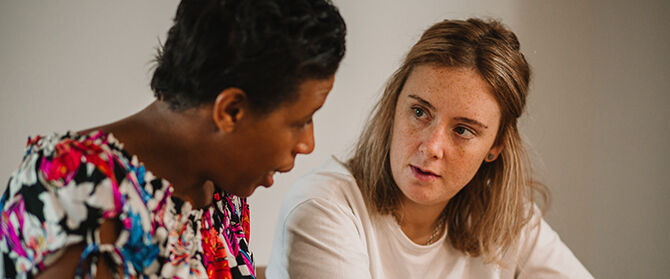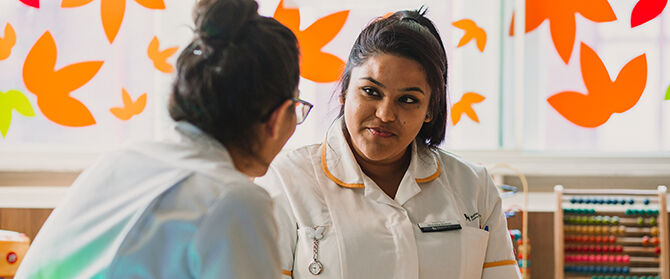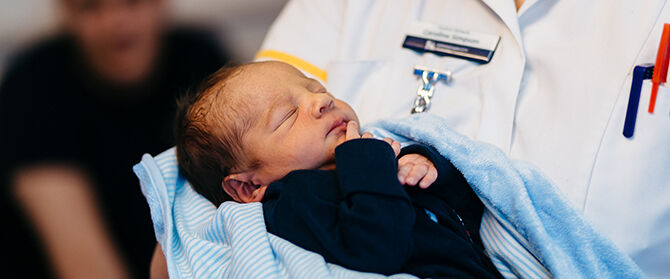Our Nursing and Midwifery courses are designed to prepare you for a number of careers ranging from Accident and Emergency to forensic services.
Click the link for your course and discover the range of opportunities available:
Adult Nursing | Learning Disability Nursing | Mental Health Nursing | Child Nursing | Midwifery
Adult Nursing
You're interested in caring for people as an adult nurse but do you know about the huge range of areas that you could specialise in as your career progresses? Here's just a few of the numerous specialist areas that could be open to you after you successfully complete your BSc (Hons) Adult Nursing degree.
Accident and Emergency
Working as an A&E nurse, the clue is in the name! Accident and Emergency involves dealing with critical patients in a high-pressure environment. You're often the first point of contact for patients coming in who could have a variety of injuries, illnesses and conditions. No two cases are the same so there's very little routine and you have to work quickly. But with all this pressure, chaos and hard work comes an incredibly rewarding career.
An overview of A&E for service users
Critical Care (ITU)
Critical care nursing is a complex and challenging area to which many nurses aspire. Also known as ITU nurses, critical care nurses use their advanced skills to care for patients who are critically ill and at high risk for life-threatening health problems.
Why ITU might be the choice for you
District/Community nursing
District nurses play a crucial role in the primary healthcare team. You visit people in their own homes or in residential care homes and, increasingly, provide complex care for patients and support for family members.
Watch the NHS video on district nursing careers
Oncology nursing
Oncology nurses specialise in treating patients diagnosed with cancer. You have to be able to educate patients and their family members across the treatment and be truthful about their illness. You are required to carry out assessments on the patient's medical state and intervene when needed to help improve the patient's wellbeing and (hopefully) recovery.
Five minutes with an acute oncology nurse
Practice nurse in a GP surgery
As a Practice nurse you would work in a GP practice to assess, screen, treat and educate patients, and help doctors give medical care. Experience of working in chronic disease management (like diabetes or asthma), wound dressing, childhood immunisation, cervical cytology and phlebotomy (taking blood) can help you in this role.
More about General Practice nursing
Diabetes nurse
A diabetes nurse helps patients that have diabetes, a disease that prevents the body from producing or absorbing enough insulin. Since much of their job is spent relaying important information between patients, doctors, and family members, a diabetes nurse's greatest asset is their ability to communicate. We offer a specialist Master's programme in Advancing Diabetes Care.
What is a Diabetes Specialist Nurse?
Find out about how our Careers and Student Opportunities service can help you
Learning Disability Nursing
You're passionate about supporting people with learning disabilities and helping some of the most vulnerable people in society, but do you know about the wide range of career opportunities that you will be eligible for after successful completion of our BSc (Hons) Learning Disability Nursing course? Here's just a few of the numerous specialist areas that could be open to you after you successfully complete your degree...

Specialist epilepsy clinics
Specialist epilepsy clinics for people with learning disabilities provide support for people who have epilepsy that's difficult to control. At a specialist level, this may also involve you as a nurse both prescribing and running nurse-led clinics.
Community Learning Disability Nursing Teams
You would carry a caseload and support people with learning disabilities, as well as their families, to live in the community, usually in their own homes. This may include providing training and education to carers as well as therapeutic and clinical skills. This can involve you performing a more specialist role, for example community nurses can dedicated to challenging behaviour, epilepsy, older adults etc.
Specialist residential support units
These units are for people with learning disabilities and other needs, such as challenging behaviour, physical disabilities or autism, where 24-hour nursing care is provided for this specialist group. Working in this setting may also offer the opportunity for develop into a managerial role.
Child and Adolescent Mental Health Services (CAHMS)
In this setting you would support children and young people who have learning disabilities and mental health problems in the community. This can include supporting children with challenging behaviours.
Forensic settings
This can include interim secure units and prisons, supporting people with learning disabilities who have gone through the criminal justice system, for example arsonists, sexual disorders/crimes etc.
Hospital liaison/Health facilitation
This role involves liaising with GPs, doctors and nurses in primary care settings to enable people with learning disabilities to access the primary care they need.
Special schools
You could work as a school nurse in a school with children who have learning disabilities.
Find out about how our Careers and Student Opportunities service can help you
Mental Health Nursing
You're interested in BSc (Hons) Mental Health Nursing and supporting some of the most vulnerable people in society, but do you know about the range of careers that will be available to you once your course is complete? Here's just a few of the numerous specialist areas that could be open to you after you successfully complete your degree...

Adult mental health services
Adult mental health services encompass a wide range of community, residential and hospital-based environments which support the mental health needs of adults. Specialist support can include crisis resolution, assertive outreach, acute in-patient services and primary care services.
BSc (Hons) Nursing (Mental Health)
Children and Adolescent mental health services (CAMHS)
Mental health services for children and young people are configured to ensure that those under the age of 25 have access to the right support at the most appropriate time. There is a focus on mental health promotion and the prevention of mental distress so many of the services on offer centre around wellbeing and combating stigma.
Mental health services for people in later life
Older people’s mental health services are likely to focus on those disorders associated with ageing, such as dementia or other organic mental health problems. Like most mental health service provision, support for older people can be in a community or in-patient setting.
A guide to older adult services
Forensic and/or prison-based mental health services
These services provide mental healthcare for mentally disordered offenders in prisons, medium secure mental health hospitals and community settings.
Service user guides to secure mental health services
Perinatal mental health services
These services provide mental healthcare for individuals and families who experience mental health problems as a result of pregnancy and childbirth. In-patient services are available in Birmingham as well as community outreach services. Birmingham is recognised as a centre of excellence for mental health service provision to mothers and their newborn children.
More about perinatal mental health
Moving up through the bands
Employment opportunities in all of the above environments are readily available for newly-qualified mental health nurses, usually starting at Band 5. In in-patient settings, Band 6 nurses usually assume some kind of line-management responsibility whereas, in community settings, Band 6 nurses will be expected to carry caseloads and have a degree of autonomous practice.
Mental Health Nursing role profile
Find out about how our Careers and Student Opportunities service can help you
Child Nursing
It won't surprise you to hear us say our graduates are highly employable! This is partly due to Birmingham being a large multicultural city, which means we provide a huge range of specialist and general services to children and young people.
Here's just a few of the numerous specialist areas that could be open to you after you successfully complete your BSc (Hons) Child Nursing degree...

Specialist cardiac nurses
The role includes managing your own caseload of children and families with complex cardiac needs. You will also support families pre- and post-surgery. You'll need to work closely with other professionals, including the fetal cardiology, transition and adolescent services, cardiology consultants, cardiac nurse practitioners, paediatricians, allied health professionals and local children’s community services.
Paediatric Intensive Care (PICU)
In PICU you care for children and adolescents (usually up to the age of 18) who have life-threatening or high-acuity conditions that require constant monitoring in a high-tech children’s services area for critically ill, medically complex and/or post-surgical patients. As with all child nursing, PICU also involves collaboration with families, doctors and other healthcare professionals or clinicians to determine the best course of patient care and recovery.
Find out more from the Paediatric Intensive Care Society
Paediatric Diabetes Specialist Nurse (PDSN)
As a PDSN your role is to establish a holistic and developmental approach to diabetes care in patients from infancy to adolescence. You'll set realistic objectives according to the child's age and level of understanding, as well as the needs of the family. Working with the wider paediatric diabetes team, you'll co-ordinate care, assessing, developing, implementing and evaluating programmes of holistic care and providing specialist clinical advice to health carers and others, such as schools. Your may work in a hospital or community setting.
The wider specialist diabetes team
Teenage Cancer Trust
Teenage Cancer Trust specialist nurses make sure young people receive the best care and support once they’ve been diagnosed with cancer. There's specialist training to understand what it's like to have cancer as a young person. The role involves being with young people when they have their treatment as well as working with doctors and other professionals to make sure young people understand their options and feel informed about what's happening to them.
Why Teenage Cancer Trust Nurses are so important
Community children's nurse
As a community children's nurse you provide nursing care to children and young people with a variety of life-limiting, life-threatening, complex disability and long-term conditions. These could be as wide-ranging as asthma, eczema or allergies, through to palliative and end of life care.
Child and Adolescent Mental Health Service (CAMHS) nurse
It's a common preconception that you must train as a mental heath nurse to work in this area but it is actually nurses who specialise in the mental and physical development of children and young people who are crucial to providing the CAMHS service. In Birmingham this CAMHS service has been extended to help bridge the gap between children's and adult services meaning that the city's Forward Thinking service is available from 0 all the way through to 25 years old.
Find out about how our Careers and Student Opportunities service can help you
Midwifery
Your ambition is to train as a midwife but are you in the know about the many career options that will be available to you once your course is successfully complete?
Take a look and find out more about where a BSc (Hons) Midwifery degree could take you, and remember, this is just a taste of the type of work you could get involved in...

Working for the Armed Forces or charities including the Red Cross, Medecins Sans Frontieres (MSF)
Wherever there are people, babies will be born and midwives will be needed. This includes military camps and areas of the world in the midst of man-made or natural disasters. You may work in a military hospital, or health centres and conduct outreach work in the community.
Domestic abuse
For many women pregnancy is a time of happiness and anticipation. But pregnancy can also be a risk factor for domestic violence. As a midwife you can expect to encounter incidents of domestic violence. The charity Refuge states that over a third of domestic violence starts or gets worse when a woman is pregnant, one midwife in five knows that at least one of her expectant mothers is a victim of domestic violence and a further one in five midwives sees at least one woman a week who she suspects is a victim of domestic violence. Domestic violence during pregnancy increases the risk of miscarriage, infection, premature birth, low birth weight, fetal injury and fetal death.
Expectant mothers using drugs and/or alcohol
In some areas there are specialist midwives who provide care for women with issues around drugs and/or alcohol. Specialist knowledge allows these midwives to provide vulnerable women with the continuity of care, time, empathy and compassion they need as well as reducing maternal and fetal morbidity and mortality.
Community midwife
As a midwife in the community you will often work in teams and provide a degree of continuity of care. You will see service users either at their home or at a clinic, and you will be available for home births when women go into labour or in hospital if it's necessary for the woman to come into hospital. You'll visit new mothers at home for up to ten days after their baby is born. Community midwives also provide postnatal care for women who have been looked after during labour by hospital midwives.
Pre- and post-natal mental health
Specialist Mental Health Midwives are expert midwives and local champions who lead work with maternity service commissioners and providers to ensure that women with perinatal mental illnesses and their families receive the specialist care and support they need during pregnancy and in the postnatal period. They support their maternity team colleagues to ensure that services deliver the best possible personalised care to these women and their families to optimise their mental health.
Hospital setting
Hospital midwives are based in a hospital obstetric, or consultant unit, a birth centre or midwife-led unit, and they staff the antenatal clinic, labour ward, and postnatal wards.
Obstetric emergencies
Pregnancy can sometimes present life-threatening health problems for a mother and her baby. These problems are called obstetric emergencies. In these cases, extra care is needed. A woman may need a lot of tests and treatments, and extended hospital stays. She may also face a premature birth or the loss of her baby. Whatever the reason for serious complications during pregnancy, they can cause frustration, distress and sometimes grief. Obstetric emergencies include miscarriage, ectopic pregnancy, pre-eclampsia and eclampsia, placental abruption, placenta previa and premature rupture of membranes (PROM).
Sonography/Ultrasound scanning
A midwife sonographer is a member of a multi-disciplinary team who performs obstetric and gynaecology ultrasound scans and provides diagnostic reports. Duties are likely to include first trimester ultrasound screening, early pregnancy ultrasound, obstetric ultrasound dating for family planning, third trimester fetal surveillance and trans-vaginal ultrasound for infertility. Of course, you will also be responsible for counselling women undertaking diagnostic testing and communicating with them the outcomes.
Neo-natal nursing
Qualified, registered adult and child nurses as well as midwives are eligible to apply to neo-natal nursing roles. Neo-natal nurses look after poorly, often premature, babies from birth to four weeks old carrying out tasks such as preparing and checking medications, managing a baby’s fluids, recording observations and documenting a baby’s care and initiating appropriate basic resuscitation in an emergency situation. You will also support parents of the baby at this stressful time.
Health visiting
Health visitors are qualified nurses or midwifes with post-registration experience who have undertaken further training and qualifications in child health, health promotion, public health and education. You work as part of a primary healthcare team, assessing the health needs of individuals, families and the wider community. Working in a community setting, you will often visiting people in their own homes to support new parents and pre-school age children.
Teenage mothers
Midwives who specialise in teenage pregnancy provide specialist midwifery knowledge and skills to support the development of multi-agency and multidisciplinary pathways of care to fulfil the holistic needs of pregnant teenagers and young parents across care settings. As a midwife in this area you may also lead and contribute to regular audit and research activities into the experiences of teenage mothers and service providers that will help shape the future of care delivery to this often vulnerable and excluded group.
Find out about how our Careers and Student Opportunities service can help you
